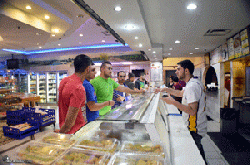DEARBORN/DEARBORN HEIGHTS — Between the hours of 12:00 a.m. and 4:00 a.m. on weekday mornings, the majority of Michigan’s suburbs are sound asleep, in preparation for the following work day. However, during the Holy Month of Ramadan the Muslim community in Dearborn and Dearborn Heights remain wide awake and out and about, as they practice a growing tradition, called suhoor.
For 30 days, Muslims have one other opportunity, after iftar (the breaking of the fast), to eat a large meal, before they must fast, from sunrise to sunset. Local businesses have taken advantage of the economic benefits that come along with Ramadan.
Most bakeries in the area have extended their hours of operation for the month. Some remain open for 24-hours a day, while others have flipped their schedules around completely, closing during the early morning and afternoon hours, and opening in the evening and well into early morning the following day.
For Golden Bakery owner Hussein Hammoud, Ramadan means business. Located at 14526 W. Warren Ave, the bakery in Dearborn stays open around the clock, while its second location, in Dearborn Heights, only closes for a few hours during the day. Customers line up to order menu items, such as cheese, oregano and meat mana’eesh; spinach and meat pies; and fresh baked bread, which many customers explain are substantial enough to fill them up well into the next day.

|
| Dearborn’s Golden Bakery, is just one of several bakeries opened around-the-clock during the holy month of Ramadan, to cater to Muslims during suhoor hours. |
Golden Bakery employee, Zaid Alnasiry, who has worked at the bakery for three years, says that he is used to adjusting his schedule during Ramadan. He works 7 days a week, from 12 a.m.-5 a.m., and then uses the opportunity to start his day early. He goes to the gym afterward and, on some days, even attends summer classes. He manages to get in a few hours of sleep during the day, before waking up to repeat the same routine again.
“It is really busy here at night. On weekdays, we usually get groups of guys who come in and eat, but on weekends we are even busier, because we get families and children,” Alnasiry tells The Arab American News.
Early morning suhoor during Ramadan appears to be most common among minors and young adults. At Golden Bakery, at around 1:30 a.m., Dearborn resident, Ibrahim Eid, 17, who drove to the bakery with a friend, says that he always tries to eat before bed, or otherwise fasting would be extremely difficult during the day. He doesn’t like to eat out every day however, because he believes it becomes too costly.
Zainab Alrfifeh, 19, and her friend Mariam Dakroub, 19, were also picking up food from Golden Bakery on this early morning. The two usually eat at either Golden Bakery, or at Princess Bakery, about two miles down the road. They agree that dining out for suhoor has become quite the norm among their friends and family.
“It’s not just a cultural thing, but it has become a tradition,” Alrififeh says.
At the other end of town, Saj Bakery seems to have become a prominent fixture for Dearborn Heights’ smaller Muslim community, thanks in part to its prime location, at the corner of Ford Rd. and Beech Daily. During the first two weekends of Ramadan, lines were nearly out the door, between the hours of 2:00 a.m. and 4:00 a.m.
Heba Sobh, a Dearborn Heights resident, says that she comes to the bakery nearly every night, but tries to come earlier to avoid the crowds.
“I try to get here before 2:30 a.m. Otherwise you are going to get stuck in long lines,” Sobh says.
With Ramadan falling right in the middle of summer, some may find it more difficult to fast, considering the longer days and hot weather, which make it easier to become dehydrated. However, the summer season has actually contributed to the overall surge in suhoor business these last few years.
With schools on recess, young adults are at leisure to flock to local bakeries with large groups of friends and family. A few residents, who don’t fast, admit that they simply enjoy taking advantage of all the bakeries that are open for service around the clock. Either way, it appears a lifestyle has unfolded from the practice of suhoor, and it’s bringing the community closer together.






Leave a Reply